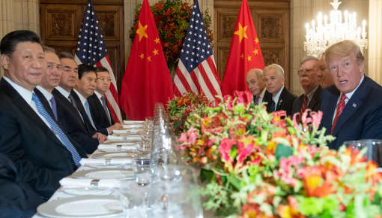- Ameya360 Component Supply Platform >
- Trade news >
- Expect a photo op and a 'mock deal' at the Trump-Xi meeting — not a long-term truce, says economist
Expect a photo op and a 'mock deal' at the Trump-Xi meeting — not a long-term truce, says economist
Expect a photo opportunity, a "mock deal," and temporary market relief from the much-touted meeting between U.S. President Donald Trump and his Chinese counterpart Xi Jinping at the G-20 meeting, an economist said on Friday.
"We don't think this deal will be engineering a long-term truce between the two countries," Bo Zhuang, chief economist and director of China research at TS Lombard, said of the meeting in Buenos Aires, Argentina next week.
Zhuang told CNBC he expected a "photo op" and a probable "mock deal" from the meeting between the leaders of the world's two largest economies, "which means there will be temporary market-positive feedback from that."
But trade tensions will continue to escalate, he added.
China's economy will be hit by the trade war, with real GDP growth getting shaved by 0.5 to 0.7 percentage points from the beginning of 2019, he said.
Zhuang said China doesn't want to provoke further escalation in bilateral relations with the U.S., but Beijing may actually let the Chinese yuan weaken should the tariff fight continue.
As for the risk of being labeled a "currency manipulator" should the Chinese yuan decline further, Zhuang said there appeared to be little downside risks from that.
"Everything has already happened i.e. putting in tariffs, negotiations. Trade war was the worse case scenario even before being labeled a currency manipulator," said Zhuang.
Online messageinquiry

China's Xi is about to deliver a speech that could have major consequences for the trade war

US will hold off on raising China tariffs to 25% as Trump and Xi agree to a 90-day trade truce

US trade representative denies report he told business executives next China tariffs on hold
- Week of hot material
- Material in short supply seckilling
| model | brand | Quote |
|---|---|---|
| TL431ACLPR | Texas Instruments | |
| MC33074DR2G | onsemi | |
| BD71847AMWV-E2 | ROHM Semiconductor | |
| CDZVT2R20B | ROHM Semiconductor | |
| RB751G-40T2R | ROHM Semiconductor |
| model | brand | To snap up |
|---|---|---|
| BU33JA2MNVX-CTL | ROHM Semiconductor | |
| TPS63050YFFR | Texas Instruments | |
| ESR03EZPJ151 | ROHM Semiconductor | |
| STM32F429IGT6 | STMicroelectronics | |
| IPZ40N04S5L4R8ATMA1 | Infineon Technologies | |
| BP3621 | ROHM Semiconductor |
- Week of ranking
- Month ranking
Qr code of ameya360 official account
Identify TWO-DIMENSIONAL code, you can pay attention to


Please enter the verification code in the image below:






















